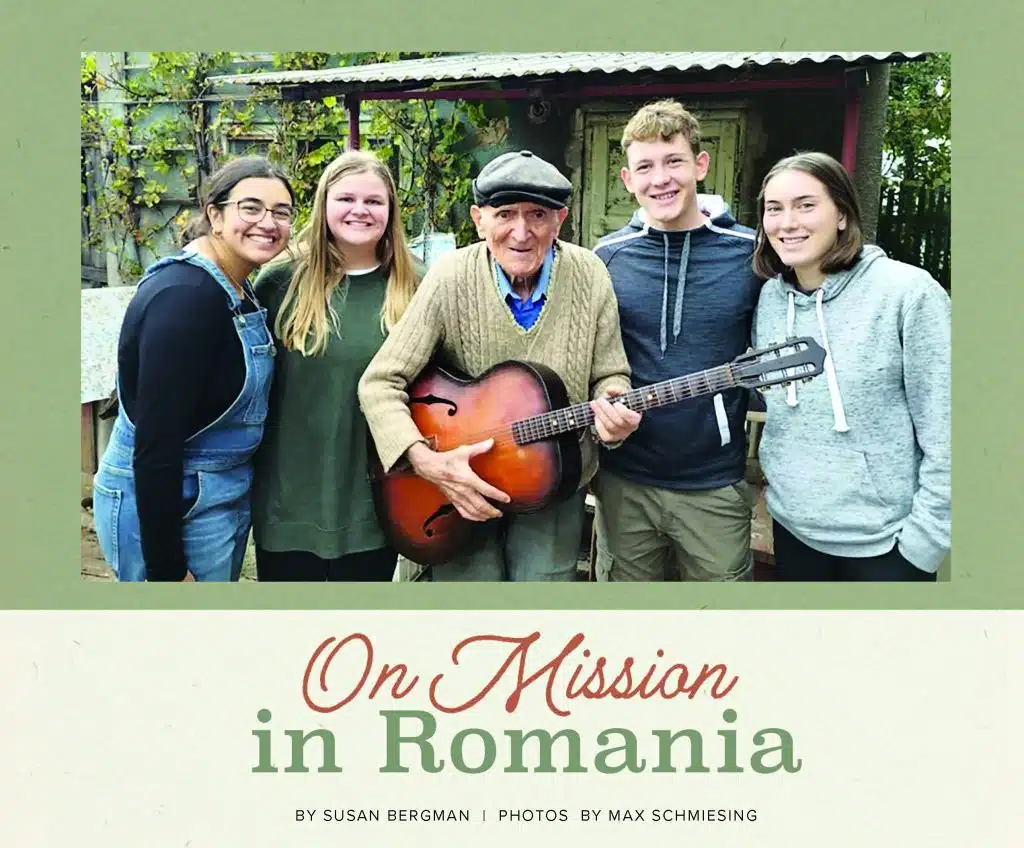On Mission in Romania

 Three students from Holy Angels Parish in Sidney, who attend St. Franciscan University in Steubenville, embarked on a life-changing mission trip to Deva, Romania. For Carianne Rindler, Agnes Schmiesing and Max Schmiesing, the experience was a profound journey of faith, love and service and a chance to connect deeply with others and with God.
Three students from Holy Angels Parish in Sidney, who attend St. Franciscan University in Steubenville, embarked on a life-changing mission trip to Deva, Romania. For Carianne Rindler, Agnes Schmiesing and Max Schmiesing, the experience was a profound journey of faith, love and service and a chance to connect deeply with others and with God.
A Ministry of Presence
The mission trip was rooted in the simple, yet powerful “ministry of presence” concept.
“I knew I was going to be a part of something quite different from anything else I had experienced, and I had no idea if I would be good at it,” Agnes said, “But I knew that God could work through me no matter how inadequate I felt.”
Max shared a similar sentiment, emphasizing the importance of being present to others: “Our mission wasn’t about preaching or teaching. It was about being with the people, listening to them, and sharing God’s love through our presence. It was a humbling experience to realize that sometimes the most profound impact you can have is just being there for someone.”
Life at the Consolatio Mission House
The students stayed with the Consolatio missionaries, who embrace a life of simplicity and humility. “The missionaries live like the locals do. They’re in the same sort of housing, they eat the same sort of food, and they wear the same sort of clothing. And still, their house is a refuge. It is truly the warmth of Christ that distinguishes them and draws people in,” said Rindler.
Particularly struck by the spirit of generosity and community among the Consolatio missionaries, Max said, “They welcomed us with open arms and made us feel completely at home. They lived frugally, not spending more than was necessary, but everything they had they shared with us and with the Romanian friends who visited. It was a beautiful example of living the Gospel.”
Daily Life:
A Balance of Prayer and Service
A typical day at the mission house began with Liturgy of the Hours and Mass, grounding the students in prayer before they embarked on their daily activities. “My time in Romania would not have been as fruitful without that time in front of the Blessed Sacrament. It added a retreat-like element to the mission that I was very grateful for,” said Agnes.
Students then spent their mornings completing chores, often alongside the “friends” of the Consolatio missionaries. “These people weren’t patients, visitors or students,” Rindler noted. “They were called ‘friends,’ and that made all the difference. It changed my perspective on what this mission would be like and helped me know how to relate to the people I would meet.”
Afternoons were dedicated to visiting elderly friends, playing with children in the local communities and simply spending time with those often neglected. “It wasn’t about doing grand things. It was about showing up, being present and sharing God’s love through simple acts of kindness,” said Max.
Challenges and Growth
The language barrier proved a significant challenge for the students.
“It was frustrating when the point of your mission is to make connections with people, but you’re unable to speak with them,” Rindler admitted. However, she quickly learned that love transcends language. “I was there to love my neighbor. We would go out into the community with no specific plan for how we would spend our time—just hoping someone would invite us into their home or come out to play a game.”
Memorable Encounters
Each student had one experience that left a lasting impression. For Rindler, it was interacting with Nicholai, an elderly man in a wheelchair who asked her to walk him home after Mass. “I was so touched that he asked me to do this for him,” she said. “I think God gave me this opportunity in a moment where I was especially disheartened by the language barrier, to show that I shouldn’t rely so much on my words to serve His people.”
Agnes encountered a one-year-old boy from a gypsy community. “He had big, brown eyes and a beautiful smile,” she remembered. “In the short time I was with him, he made a big impression on me.”
Max observed that many of the children had never had a consistent male figure in their lives. Through simple interactions, like playing games or sharing stories, he found that his role went beyond just offering support—it provided these children with a sense of stability and comfort they hadn’t known before.
“The children craved masculine influences in their lives. The little boys wanted fathers or older brothers to play sports with. They would swarm us, take our hands and pull us to a soccer field or show us things.”
The Power of Love
This mission trip to Romania went beyond what the students could do for others to what God could do through them. It was a powerful reminder that love, presence and simplicity are at the heart of true evangelization.
“Doing even the simplest of things for the children would bring them great joy,” said Agnes, “and I knew that however little an action [was], God was able to work through that and bring joy and love to the children who were often neglected and ignored.”
This article appeared in the October 2024 edition of The Catholic Telegraph Magazine. For your complimentary subscription, click here.













